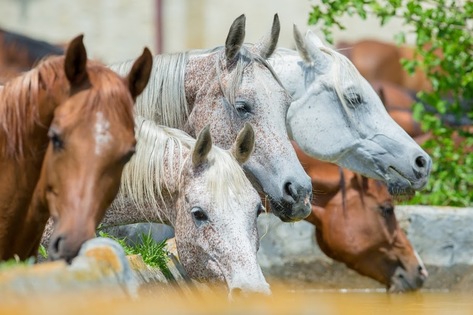
The Most Popular Horse Breeds Of 2019
Equestrian Advice & Guides General Equestrian
Build your business profile for FREE and expose your services to thousands of potential clients!
Create my profile now!
If you are lucky, sitting with a sick horse is something that you will never have to do. Or perhaps you are the type that turns away from sorrow/potential sadness and pays someone else to do this. Or your life just isn’t adaptable because you have to work to keep said horse. But while I truly hope it is something you never have to experience, it is none the less, something I find myself doing on a regular basis here in the equine rescue/sanctuary world. Sometimes when you get to stand up, you are happy, because something worked, and you have a horse on its way back to health, and hopefully, a happy life. Because I deal with aged equines I often find that, when it comes time to stand back up, I am reaching for my phone, and having to deal with what is now considered a carcass, which minutes ago was a friend. After the tears. I am aware that the day I don’t ugly cry for a horse is the day I need to quit.
Don’t get me wrong, there are horses that you plan for. The old gelding with the bad knee that we had to help up 5 times one winter, because he kept laying down on a slope, or the time he slipped on the ice. Here in the north we often talk about “not asking a horse to go thru another winter”. When you are lucky enough to have old horses (yes, I mean that) it means that at some point, if you are a good horseman, you will make the tough decision to put a horse down.
It wears you down to rise at 5am, and put on the clothes you stepped out of to go to bed. To go right back out the door and head to the barn you feel like you just left. I have been struggling with this horse for more than a week, and at this moment I don’t know if I should hope to find him up or the alternative. But as I enter the barn and round the corner to peer in his stall, I find him looking at me, ears perked, as if he is waiting to be tacked for a lesson. But further investigation reveals the uneaten mash, and perhaps an inch of water gone from his bucket. I can tell from the shavings on his side that he has been laying down, but there are only 3 or 4 small ‘horse apples’ in his stall. These are not promising signs and I wonder how this bright looking animal can actually be so sick. How can I be having to think about making the decision to put him down, when he is looking at me like this, so bright and full of life? The rational part of my brain knows that he is looking like this because he is full of pain-killers, and when he is not in pain, he looks almost fine, but as they wear off, he will be miserable, with no appetite, and unable to poop due to an enormous mass tucked into his pelvis that is pressing against his bowel, preventing the passing of manure.
He has been seen by 2 different Vets, not for a 2nd opinion, but because our regular guy was out of town. That probably helped, but I implicitly trust our own vet as I never feel like he is trying to sell me something. If he says we should transport a horse to a clinic, it’s for a VERY good reason, because he doesn’t have his own hospital, so he won’t be making the money. We have done this 2 other times, trying to give a horse a chance. In neither instance did I bring a horse home, but there were no doubts that I had done all I could.
He has informed me that even if this gelding was young (he’s not) and money was no object, (it is) there would probably be no good outcome in trying to remove the tumor. That often in these cases once they open the horse up, they find tumors elsewhere as well. And truthfully, none of our horses are surgical candidates. Where my farm is located it is generally $10K to walk thru the door for an equine surgery. That’s just to start. We can rescue a lot of horses with $10K+.
So I will sit with this sick horse. I will give him his prescribed meds. I will cry and let my tears fall on his mane as I tell him what a great horse he has been for us, how much his riders will miss his antics, and all the lessons he would have taught them. I will call the vet to give him an update, and we will make a plan. In my heart I know that this episode of sitting with a sick horse is nearing its end, and I try to be grateful that this beautiful boy will no longer be in pain, and my worry and stress will be over, but I also can’t muster those feelings right now. Right now, all I will have is the pain and loss of this beautiful life, but I will turn and continue to care for all the others in this barn, until it’s time for me to sit with them.

